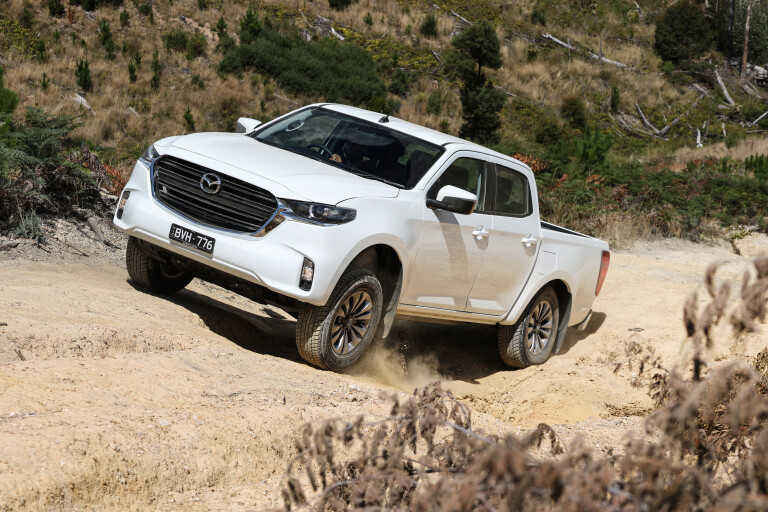
Things we like
- Feels premium for an entry level
- Decent off-road
- 1.9 is competent
Not so much
- Not a significant cost saving
- Unladen ride
- NVH can be intrusive
A key to Mazda’s platform-sharing arrangement with Isuzu is that the latest-gen BT-50 shares Isuzu’s venerable 3.0-litre turbo-diesel engine; an engine praised for being unstoppable and ‘truck tough’. It’s just a D-MAX disguised as a BT-50 ... yeah?
Since Mazda severed ties with Ford and began its new relationship with Isuzu, the BT-50 has been somewhat of a sales success, despite the tribulations brought to the market by COVID – in fact, the BT-50 registered a sales record of 1222 in January 2022.
Helping with that sales success is in large part thanks to the popularity of said 3.0-litre, four-cylinder engine, code-named 4JJ3-TCX in its current iteration. That’s why the addition of a new variant powered by a 1.9-litre turbo-diesel engine is cause for a double take or two.
🚀 Hello from the future! You can continue reading this story, or you can visit our latest BT-50 Range Review linked below.
REVIEW CONTINUES...

Price point
Dubbed the XS, the 1.9-litre variant is the new entry-level model in the BT-50 line-up. The cheapest entry point is the XS single-cab chassis in 4x2 configuration, priced at $33,650.
However, for those who prefer to pack up the tools and chase off-road trails on weekends, the only 4x4 variant in XS trim is the XS dual-cab pickup, listed at $51,240. It’s also the model we recently took off-road.

Engine performance
The 1.9-litre engine generates 110kW and 350Nm, significantly less than its more renowned 3.0-litre stablemate (140kW and 450Nm). In XS 4x4 form, the only option is to run that through a six-speed automatic transmission, as no manual gearbox is available ... unfortunately.
Mazda lists the smaller-capacity engine with a combined fuel consumption of 6.9L/100km. We ended a week of on- and off-road driving with the figure sitting at 9.5L/100km.

Despite a drop of more than a litre in capacity, the 1.9-litre engine is a competent performer both on- and off-road. As you’d expect, it needs to work harder, earlier; but once you’re up to cruising speeds, it’ll sit comfortably at around 1750rpm in top gear.
The six-speed Aisin transmission is mated well to the 1.9-litre engine, engaging the required gears without too much fuss. Occasionally it’ll need a bit of help to drop down (or back up) when off road, but this was a rare occurrence.
Off-road
Like many unladen dual-cab utes, the BT-50 XS would benefit from some weight in the tray. Unladen, the XS does bounce and sway on sweeping bends and undulating gravel back-roads – nothing 100kg strapped down in the tray wouldn’t fix.
The part-time 4WD system – with high and low range – can be easily selected via a rotary dial located in a great spot on the centre console. A driver-selectable rear locking diff is standard, and easily located and engaged when required.

On some scrabbly climbs in the Mount Macedon region of Melbourne, the 1.9L felt as capable as the 3.0-litre SP variant we’d previously steered off-road at launch. The leaf-sprung rear-end did slap around at times, but the vehicle remained compliant and at no stage struggled despite some challenging terrain.
Ground clearance sits at 235mm, and we managed to scrape on a few steeper sections. Adequate approach and departure angles (30° and 23.9° respectively) and an 800mm water-fording depth (close to the class leader) makes the XS a great all-round performer.
One issue from our off-road excursion, which also translates to the on-road experience, is engine NVH can be intrusive. As the 1.9 needs to work harder to get the vehicle up a steep track or ahead of a slow road train on bitumen, it can be quite an earful until it settles at the mid-range.
The XS 4x4 wears 17-inch alloys – 17-inch steelies on 4x2 models – and on our test vehicle they were wrapped in 255/65R17 Dunlop Grandtrek AT25s.
Interior
For its $51,240 asking price, the XS loses a few nice-to-haves that are standard on the premium models. Gone are the dual-zone climate control, leather-clad steering wheel and gear-shift lever, front seat warmers, and automatic seat adjustment.
Instead, the XS model has vinyl in lieu of carpet (a benefit to some), comfortable and supportive cloth trim pews instead of leather seats fused with synthetic-suede seen on the SP, and two speakers instead of eight.

As mentioned in our launch review, the XS has the smaller seven-inch touchscreen with a few apps (best avoid Mazda’s standalone sat-nav software). It does come with Apple CarPlay and Android Auto connectivity, but Android Auto failed to recognise my Samsung Galaxy following numerous attempts with different cables – Mazda says that not all devices support connectivity, so it might be best to check with your Mazda dealer first.
The placement of buttons instead of dials for common uses – temperature and volume control, for example – is an annoyance, especially off road, and it would be nice to see simple dials used instead.
Safety
The BT-50 was awarded a five-star safety rating by independent body ANCAP. It features a full suite of advanced safety tech: Anti-lock Braking System (ABS); Autonomous Emergency Braking (AEB); Braking Assist (BA); Electronic Brake-force Distribution (EBD); Electronic Stability Control (ESC); Emergency Stop Signal (ESS); Hill Descent Control (HDC); Hill Launch Assist (HLA); and a Traction Control System (TCS).

Mazda also listened to consumer feedback and added a new Lane Support system button to the steering wheel of all variants, so users can toggle the tech on or off with their right thumb.
Verdict
Despite its entry-level status, the XS still asks for more than $50K in 4x4 form. The easiest way to think of an XS is that it’s an XT – the previous entry-level BT-50 – with a smaller engine. The XT retails for $53,360; the XS for $51,240. So the savings to be had opting for the smaller-capacity XS over the equivalent XT variant is just $2120. Think of it this way: Is it worth losing 1.1 litres in capacity for $2120?

In saying that, despite its size, the 1.9-litre engine is competent on both on- and off-road tracks ... we’d still prefer to stick with the ‘truck tough’ 3.0-litre engine, though.
2022 Mazda BT-50 XS 1.9 4x4 specs
| ENGINE | 1.9L four-cylinder turbo-diesel |
|---|---|
| CAPACITY | 1898cc |
| MAX POWER | 110kW at 3600rpm |
| MAX TORQUE | 350Nm at 1800 to 2600rpm |
| GEARBOX | six-speed automatic |
| 4X4 SYSTEM | Part-time with high/low range |
| FRONT SUSPENSION | IFS with coil-over dampers and anti-roll bar |
| REAR SUSPENSION | Live axle with leaf springs |
| TYRE/WHEEL | 255/65R17 / 17-inch alloy |
| KERB WEIGHT | 1935kg |
| GVM | 3100kg |
| PAYLOAD | 1165kg |
| TOWING CAPACITY | 3000kg |
| GCM | 5500kg |
| SEATING | 5 |
| FUEL TANK | 76L |
| ADR FUEL CLAIM | 6.9L/100km |
| ON-TEST FUEL USE | 9.5L/100km |
| DEPARTURE ANGLE | 23.9° |
| APPROACH ANGLE | 30° |
| RAMPOVER ANGLE | 23.3° |
| WADING DEPTH | 800mm |
| GROUND CLEARANCE | 235mm |
Things we like
- Feels premium for an entry level
- Decent off-road
- 1.9 is competent
Not so much
- Not a significant cost saving
- Unladen ride
- NVH can be intrusive



COMMENTS